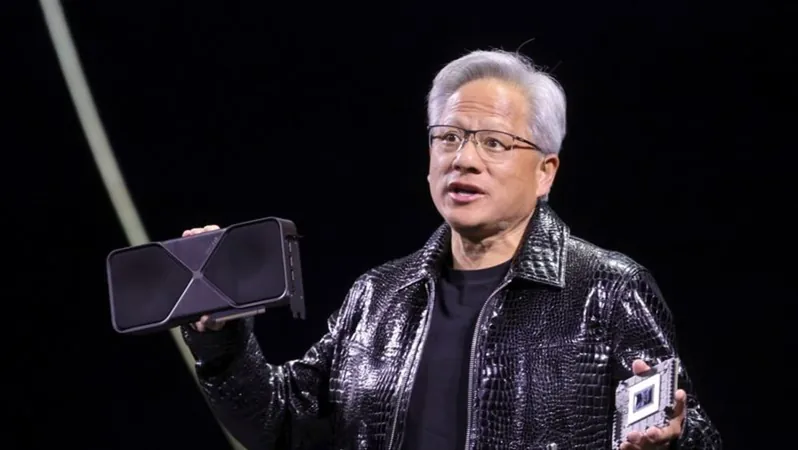
Nvidia CEO Unveils Cutting-Edge Robot Training Technology, Major Partnership with Toyota, and Next-Gen Gaming Chips
2025-01-07
Author: Daniel
Introduction
In a groundbreaking keynote at the CES 2025 conference in Las Vegas on Monday, Nvidia's CEO Jensen Huang showcased the company's latest innovations aimed at revolutionizing the fields of robotics, autonomous vehicles, and the gaming industry. As the world’s second-most valuable company, valued at $3.66 trillion, Nvidia is positioning itself at the forefront of artificial intelligence advancement.
Nvidia's Cosmos Foundation Models
One of the highlights was the introduction of Nvidia's new Cosmos foundation models, which generate incredibly realistic video content to train robots and self-driving vehicles more efficiently and cost-effectively. These models create what is known in the tech community as "synthetic" training data, allowing machines to comprehend the physical world in a manner akin to how large language models enable chatbots to understand human language.
With Cosmos, users can input text prompts to generate videos that strictly adhere to the principles of physics. This innovative approach slashes the costs associated with traditional data collection methods, which typically involve extensive real-world data-gathering through fleets of vehicles in the case of autonomous cars, or repetitive task demonstrations for humanoid robots.
Huang also acknowledged that while groundbreaking, the Cosmos models will need significantly more data to reach their full potential, akin to achieving a "ChatGPT moment." The models will be available under an open license, mirroring Meta Platforms' Llama3 language model approach, which has gained substantial traction in the tech landscape. Huang expressed high hopes that Cosmos will revolutionize the fields of robotics and industrial AI just as Llama3 has impacted enterprise AI.
Next-Gen Gaming Chips
On the gaming front, Nvidia unveiled its highly anticipated RTX 50 series gaming chips, which leverage Nvidia's advanced 'Blackwell' AI technology. These next-gen chips promise to elevate video gaming experiences with stunning, movie-like graphics, particularly in enhancing the realism of character faces and intricate details like imperfections on surfaces—think realistic ceramic teapots complete with subtle fingerprints.
The RTX 50 series will range in price from $549 for mid-tier models to $1,999 for top-of-the-line variations, with the most premium models scheduled for release on January 30, followed by the lower-tier options in February. Notably, the $549 models are designed to match the performance of Nvidia’s former flagship chip, the RTX 4090, which retailed for $1,600.
Partnership with Toyota
In a significant partnership announcement, Huang revealed that automotive giant Toyota will implement Nvidia's Orin chips along with its automotive operating system to enhance advanced driver assistance systems across various models, although specific details on the vehicles were not disclosed. Huang projected a boost in Nvidia's automotive hardware and software revenue, anticipating growth from $4 billion this fiscal year to $5 billion by 2026.
Conclusion
CES 2025, running from January 7-10, serves as a global platform for unveiling pioneering technologies ranging from automotive advancements to the latest in consumer electronics, shedding light on the transformative impact of artificial intelligence across industries.
As Nvidia continues to set records, its stock closed at an all-time high of $149.43 on Monday, reinforcing its status as a titan in the tech industry, second only to Apple. Stay tuned for more updates as Nvidia leads the charge in AI and tech innovations!





 Brasil (PT)
Brasil (PT)
 Canada (EN)
Canada (EN)
 Chile (ES)
Chile (ES)
 Česko (CS)
Česko (CS)
 대한민국 (KO)
대한민국 (KO)
 España (ES)
España (ES)
 France (FR)
France (FR)
 Hong Kong (EN)
Hong Kong (EN)
 Italia (IT)
Italia (IT)
 日本 (JA)
日本 (JA)
 Magyarország (HU)
Magyarország (HU)
 Norge (NO)
Norge (NO)
 Polska (PL)
Polska (PL)
 Schweiz (DE)
Schweiz (DE)
 Singapore (EN)
Singapore (EN)
 Sverige (SV)
Sverige (SV)
 Suomi (FI)
Suomi (FI)
 Türkiye (TR)
Türkiye (TR)
 الإمارات العربية المتحدة (AR)
الإمارات العربية المتحدة (AR)